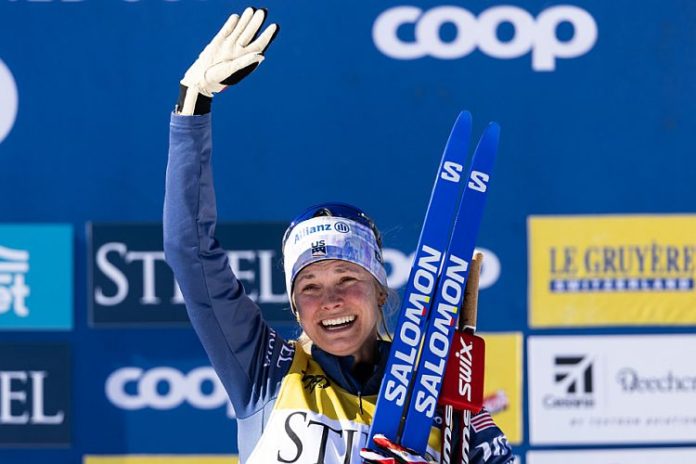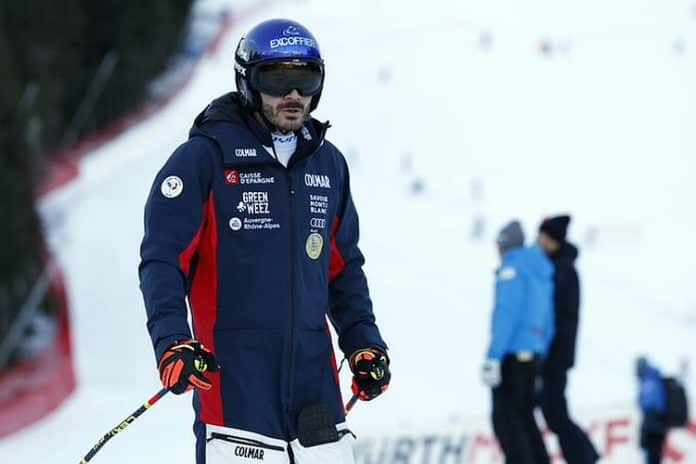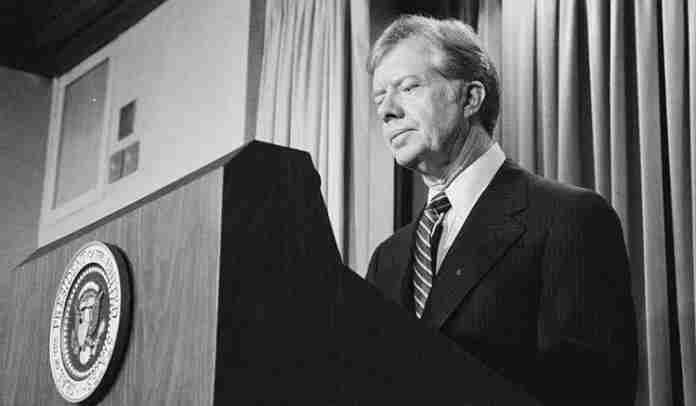★ The Sports Examiner: Chronicling the key competitive, economic and political forces shaping elite sport and the Olympic Movement.★
★ To get the daily Sports Examiner Recap by e-mail: sign up here! ★
≡ THE 5-RING CIRCUS ≡
● Olympic Games 1980: Moscow ● /Update/ Jimmy Carter, the 39th President of the United States, passed away at age 100 on Sunday in Plains, Georgia.
He served from 1977-81, rising from a little-known governor to U.S. President, but had a troubled term, marked by high inflation and the Iran hostage crisis in 1979. He won the Nobel Peace Prize in 2002 for his post-presidential work in promoting peace.
Carter was no friend to the U.S. Olympic Movement, although he did sign the landmark Amateur Sports Act of 1978, which placed the U.S. Olympic Committee (now U.S. Olympic & Paralympic Committee) in charge of Olympic sport in the country. But he could not be bothered to attend the formal signing of the award of the 1984 Olympic Games to Los Angeles – at The White House – in October 1978, and, following the Soviet invasion of Afghanistan in 1979, led a boycott of the 1980 Olympic Games in Moscow.
The U.S., along with 62 other National Olympic Committees, did not participate in the Games, and that action led to a retaliatory boycott of the 1984 Los Angeles Games by 14 nations. Moscow 1980 is the only Olympic or Winter Games that the U.S. has not participated in.
● Paralympic Games ● A CNN story on Sunday explored wide inconsistencies between medal bonuses for Olympic and Paralympic athletes across competing nations. In the U.S., the Olympic and Paralympic teams are administered by the same agency – the U.S. Olympic & Paralympic Committee – which pays the same bonuses to athletes for both events.
In other countries, there are often separate entities, although more National Olympic Committees are beginning to take on responsibilities for Paralympic athletes and teams.
● World Anti-Doping Agency ● The Russian news agency TASS reported on the exact amounts owed to WADA by the U.S. and Russian governments and others:
● $3,624,983 due from the U.S. for 2024
● $1,335,680 due from Russia for 2024
● $1,213,786 due from Russia for 2023 ($2,549,466 total)
● $693,889 due from Spain for 2024
● $270,458 due from Kuwait for 2024
TASS said that Russian officials had tried to pay, but WADA “was refusing to accept the contribution for 2023 under various pretexts.” The Russian Anti-Doping Agency continues to be held “non-compliant” by WADA.
WADA and the U.S. Anti-Doping Agency have been in a continuous war of words since the mass-positives incident of 23 Chinese swimmers from January 2021 was reported earlier in 2024, and the U.S. government has held back dues payments so far.
● Russia ● “The most difficult situation is in winter sports. Those who qualify will definitely be supported by the Ministry of Sports and the Russian Olympic Committee, but there will be few of us for now. This is due to the fact that selections will begin soon, but not all federations have ‘opened.’ There is also a problem in biathlon, among skiers.”
That’s Russian Sports Minister and Russian Olympic Committee President Mikhail Degtyarev, in an interview with Russia 24 television. He added:
“I have some hopes for hockey, I’ll be honest. Our guys play great in the National Hockey League, and if I were the organizers of the Olympic Games and the International Ice Hockey Federation, I would, of course, allow Russia in because it would immediately increase the entertainment value, and they love money there, they know how to make it, and the box office would be completely different.
“So for now, there will be a truncated format, but by 2028 in Los Angeles, I’m sure our team will be fully armed.”
Since the Russian invasion of Ukraine in February 2022, the International Olympic Committee has recommended banning all Russian and Belarusian teams, but allowed a small number of “neutral” athletes – who are not supporting the war – to compete at the Paris 2024 Olympic Games.
● Alpine Skiing ● The men’s Downhill and Super-G in Bormio (ITA) were marred by two bad training crashes on Friday, but when the racing did start, it was a Swiss 1-2 with Alexis Monney, 24, taking his first medal and first win in Saturday’s Downhill in 1:53.43. Teammate Franjo von Allmen was second (1:53.67); Sam Morse was the top American, in 34th (1:56.42).
Sunday’s Super-G saw another crash, as Swiss Gino Caviezel, 32, rolled off the course about 45 seconds in and had to be airlifted out. He was immediately taken to Switzerland for care for a shoulder dislocation and a “complex knee injury.”
The race was held up for about 20 minutes, then resumed, with Norway’s Fredrik Moeller getting his first World Cup win in 1:29.22, just 0.20 up on Austria’s 2021 World Champion, Vincent Kriechmayr (1:29.42) and Monney in third (1:29.46).
Kyle Negomir was the top U.S. finisher in 21st place, in 1:31.13.
In view of the crashes, the Italian news agency ANSA reported a statement from the 2026 Olympic organizers:
“[T]he Milano Cortina 2026 Foundation reiterates its unwavering commitment and attention, in synergy with the federations and the IOC, to place the athletes in the best safety conditions and in facilities and structures capable of making them perform at their best.”
¶
At the women’s Giant Slalom in Semmering (AUT), it was Italy’s Beijing 2022 runner-up Federica Brignone with her 29th career World Cup gold, with the fastest first run and second-fastest second run to win in 2:03.14 over Beijing Olympic champ Sara Hector (SWE: 2:03.71). American Paula Moltzan was fifth (2:04.25).
The Slalom on Sunday belonged to Croatian 20-year-old Zrinka Ljutic, who led the first run by 0.51 and then won the second run as well to finish in 1:43.33. That was well clear of German Lena Duerr (1:45.08) and Katharina Liensberger (AUT: 1:45.18). The top American was A.J. Hurt in 18th (1:47.32).
It was Ljutic’s first World Cup win, after four silvers and a bronze in the past two seasons. The Associated Press reported it was the “first World Cup victory for a Croatian woman since four-time Olympic champion Janica Kostelic earned her 30th and last win in March 2006.”
● Athletics ● Track & Field News has revealed its Athletes of the Year: Swedish vault star Mondo Duplantis for the men and 400 m hurdles world-record setter Sydney McLaughlin-Levrone.
McLaughlin-Levrone was asked if he might take events other than the 400 hurdles at a future Olympic Games: “I don’t know that I can give a definitive yes or no. I do love doing other events. There’s other events that I haven’t done since high school that I’d also love to do.”
● Cross Country Skiing ● The opener of the 19th Tour de Ski in-season tournament opened in Toblach (ITA), with four-time World Cup champion Johannes Hoesflot Klaebo winning his fourth race of the season in the men’s Freestyle Sprint.
He crossed in 2:32.34, just ahead of Lucas Chanavat (FRA: 2:32.76) and Swiss Janik Riebli (2:32.83).
Klaebo then led a Norwegian sweep in Sunday’s 15 km Classical Mass Start, winning a tight race in 38:24.4, with Erik Valnes just 0.6 behind and Haavard Moseby third in 38:25.6.
¶
The women’s Tour de Ski started with the second win of the season for defending World Cup champion Jessie Diggins of the U.S. in 2:59.62 in the Freestyle Sprint, with Finland’s Jasmi Joensuu a close second at 2:59.93.
The 15 km Classical Mass Start was another showcase for Diggins, winning in 42:23.6, edging Kerttu Niskanen (FIN: 42:24.1) and Astrid Slind (NOR: 42:24.3) at the line. Diggins now has 24 World Cup wins, but this one was special, as it was her first in a Classical-style race. Her prior 23 wins were all in Freestyle races.
Already the defending World Cup seasonal champion, she leads the 2024-25 standings with 758 points to 579 for German Victoria Karl.
● Ski Jumping ● One of the great prizes in jumping is the annual Four Hills Tournament, always held over the New Year’s week, opening in Obertsdorf (GER) on the 137 m hill, with 2015 winner Stefan Kraft taking the first stage with 335.1 points, leading an Austrian sweep.
Jan Hoerl was second at 331.6 and Daniel Tschofenig took third (323.6). It’s Kraft’s fourth career win in a Four Hills event, and his third at Obertsorf.
Next up is Garmisch (GER) on New Year’s Day, then Innsbruck (4 January) and Bischofshofen in the 6th.
● Ski Mountaineering ● The International Ski Mountaineering Federation (ISMF), an added sport for the 2026 Olympic Winter Games in Italy, announced that five Russian athletes have been approved to compete as “neutrals” during this ISMF World Cup season.
¶
★ Receive our exclusive, weekday TSX Recap by e-mail by clicking here.
★ Sign up a friend to receive the TSX Recap by clicking here.
★ Please consider a donation here to keep this site going.
For our updated, 885-event International Sports Calendar for the rest of 2024, 2025 and beyond, by date and by sport, click here!


























